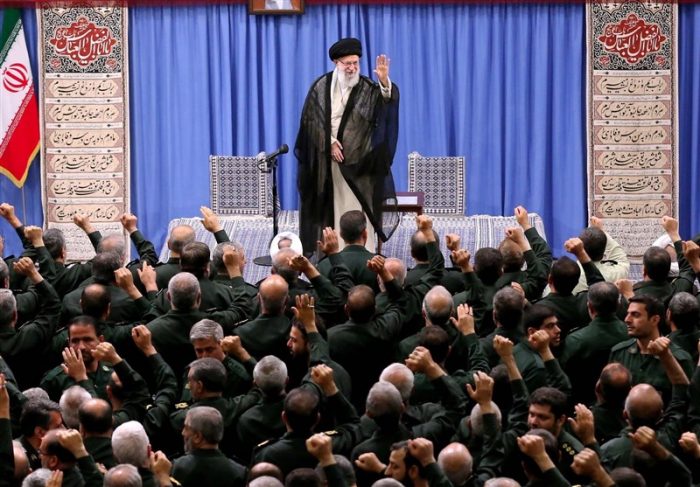
The Iranian regime Supreme leader speaking to the oppressive IRGC commanders- File photo
On Tuesday, the state-run Tabnak daily published an opinion piece about the recent broadcast forced confessions of protesters who were arrested during the November Uprising. The article, written by Majlis (parliament) member Mahmoud Sadeghi, urged the regime to “present undeniable documents to the public,” rather than broadcasting forced confessions.
“We’ve drafted a bill to ban the broadcasting of radio and television confessions. Even though the bill is still waiting its turn to be examined and hasn’t been ratified, the current regulations don’t allow the broadcasting of such confessions… Instead of broadcasting the confessions of individuals, it is necessary to inform the public of undeniable documents… [officials] must take note of this important consideration that, in the days that the feelings of citizens and the society is hurt, they should not further pain the people by associating protesters with foreign states and influence,” wrote Sadeghi.
“Actions such as broadcasting forced confessions will only deepen the public resent, like embers that will flare up again when you stir the ashes.”#Iran#IranProtestshttps://t.co/84b2lhdsqG
— People’s Mojahedin Organization of Iran (PMOI/MEK) (@Mojahedineng) December 11, 2019
The regime has claimed that the uprising was led by MEK members outside of the country, a theory that has no basis in fact, especially considering that the mullahs cut off access to the Internet a day into the protests. MEK Resistance Units are active within the country and are led by Iranians, with widespread support throughout the country.
MEK’s Pivotal Role in #Iran Uprising https://t.co/pEW4Wrxuj6#IranProtest #MEK #FreeIran @USAdarFarsi
— MEK Iran (Mujahedin-e Khalq) (@MEK_Iran) December 7, 2019
Forced Confessions
Sadeghi’s comments come in response to a recent series of public forced confessions from protesters who were arrested during the November Uprising. More than 12,000 people were arrested during the protests that spread to 190 cities around the country, and over 1,000 were killed by regime security forces.
MEK: 1000 Martyrs and #Iran Uprising Continues into Third Week https://t.co/e6mV6oYthp#IranProtest #FreeIran #MEK @USAdarFarsi
— MEK Iran (Mujahedin-e Khalq) (@MEK_Iran) December 7, 2019
The regime has struggled to fully suppress the rebellion and has alternately attempted to placate the people with claims of “Islamic Kindness” and intimidate them with threats of execution. The current tactic of broadcasting confessions, which are coerced under torture, is an old technique used by the regime to intimidate the people into submission. It has been met with public outrage.
A Futile Technique
On December 3rd, regime Interior Minister Abdolreza Rahmani Fazli recommended that forced confessions should be broadcast on state TV, and Sadeghi warned that the move would worsen public resentment. “Actions such as broadcasting forced confessions will only deepen the public resent, like embers that will flare up again when you stir the ashes,” he said.
He also said that the confessions were useless, as the people who made them usually recanted after they were released from prison.
Backtracking
Sadeghi appears to be making a fevered attempt to distance himself from the mullahs now that the tide of public opinion has turned against the entire regime. He made additional complaints that the Majlis was left out of the gas price hike decision that triggered the uprising. “We didn’t even allow the MPs to pose questions, and this caused the society to be in the dark and confusion,” he said.
This contradicts statements from regime Supreme Leader Ali Khamenei, who said that the decision to raise gasoline prices was made jointly by all three branches of government, with his full support.
Now that the regime is facing widespread public outrage and possible overthrow, officials are rushing to distance themselves from the decision. Most notably, regime President Hassan Rouhani claimed that he “learned about the price hike on the day it became effective.”
Widespread protests erupted across #Iran because of oil prices hike. The protests which first started because of oil prices climb soon turned to become a widespread uprising targeting Ali Khamenei, Hassan Rouhani, and demanding the overthrow of the regime#IranPortests #MEK pic.twitter.com/E7NI1q2F5w
— MEK Iran (Mujahedin-e Khalq) (@MEK_Iran) November 30, 2019
